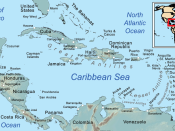This is the very first book that I have ever read on the Caribbean, and it was really a useful book that broadened my knowledge about the topic at hand. Ward did a superb job of examining the economic history of the Caribbean during the period 1800 - 1960. He does this by looking at the work of different theorists since the 1800s. He analyzes these different writings by looking at slavery, emancipation and its effects, and the difficulties of economic development. Throughout the book, Ward looks at the debates these theorists have put forward and then examines which view better explained life in the Caribbean during that period.
Ward examines the Caribbean as a whole, in its entirety. He does this by emphasizing that, in the fifteenth century, the Europeans began to occupy the Caribbean and this influenced its economic history. They did this by bringing hundreds of African slaves into the Caribbean.
These slaves were used to work on the sugar plantations. Thus, Ward looks at how the Caribbean became dependent on slavery and large-scale sugar plantations, which was their main primary crop. He also discusses the effects of this and how this contributes to what the Caribbean is today. In addition, he looks at what happened to the Caribbean's economy when slavery was abolished.
Ward argues that even before slave emancipation occurred, the economic development in the Caribbean, especially in the northern European colonies, was limited because they were relying on only one crop. Thus, they were very vulnerable to drought, decreases in sugar prices, plant diseases and so on. However, Ward argues that, despite its damaging effects, sugar plantations offered the best chance of prosperity. I disagree with this and feel that if the Caribbean had produced a number of smaller crops such as coca, tobacco...


